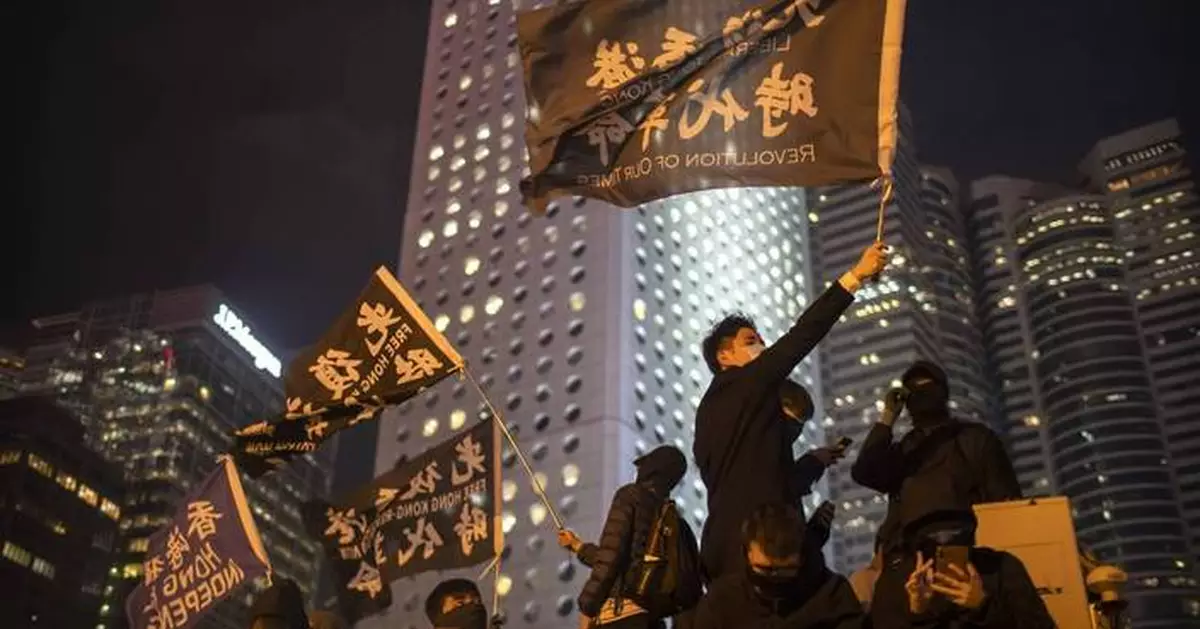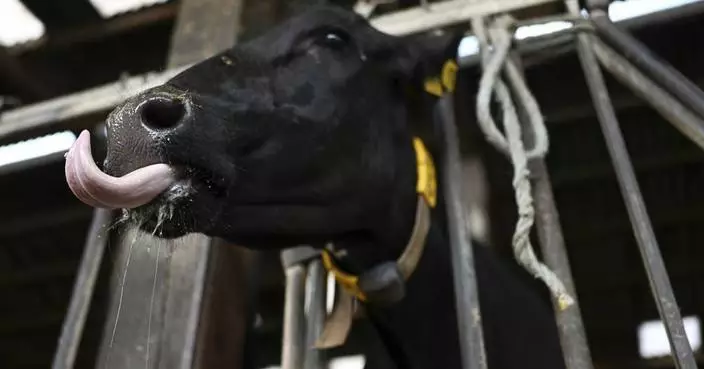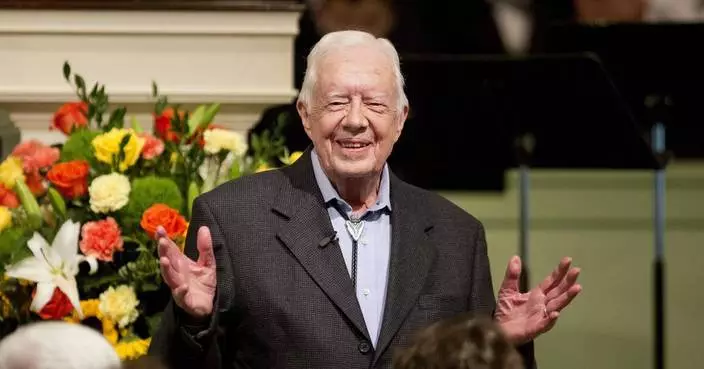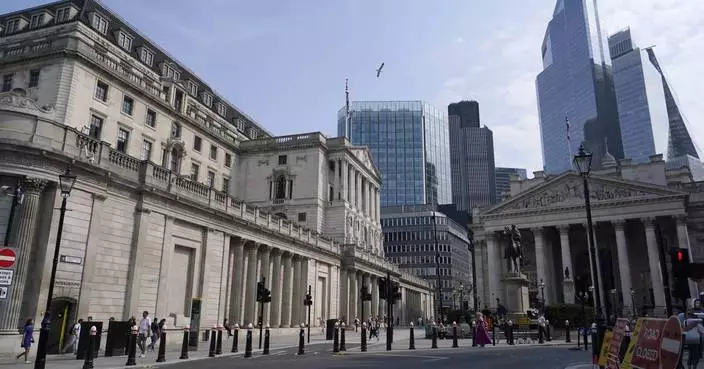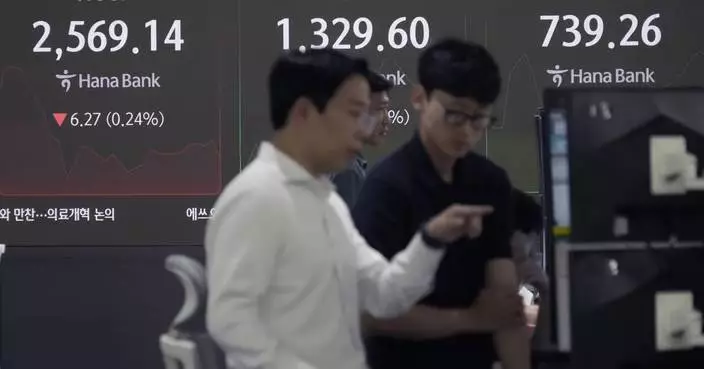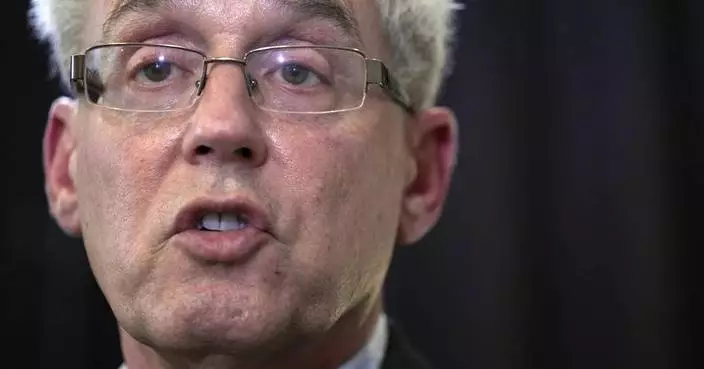HONG KONG (AP) — A Hong Kong court sentenced the first two people under a tough new Hong Kong national security law on Thursday, including a man who was given 14 months in prison for wearing a T-shirt with a protest slogan. A second man received 10 months for writing pro-independence messages on the back of bus seats.
Chu Kai-pong, 27, wore a shirt on June 12 reading “Liberate Hong Kong, revolution of our times,” a slogan chanted during anti-government protests in 2019. That day was the fifth anniversary of a demonstration in which thousands of people surrounded the city's legislative council complex to protest a now-withdrawn extradition bill. Months of often-violent protests followed as demonstrators expanded their demands to call for greater police accountability and democracy.
Authorities have said the protest slogan could imply the separation of Hong Kong from China — a red line for Beijing.
Chu pleaded guilty in court on Monday to the charge of carrying out an act or acts with a seditious intent.
The city's new security law, which critics say further stifles freedom of expression, took effect in March and imposes stiffer punishments for sedition offenses. Offenders face up to seven years in prison, up from the previous maximum sentence of two years for a first offense and three years for a subsequent offense.
Colluding with an external force to carry out such activities is now punishable by up to 10 years in prison.
In handing down Chu's sentence on Thursday, Chief Magistrate Victor So said June 12 is viewed as a symbolic date among protesters and Chu's case was not minor because he used the date in an effort to encourage others to remember the unrest and revive ideas about it. That caused a great risk to social order, he said.
He noted that Chu had already been jailed for sedition earlier this year and his subsequent act showed the deterrent effect of his previous sentence was insufficient.
He said Chu “planned to commit a crime shortly after he was released from prison and was evidently unwilling to reform,” but reduced the prison term by one-third because of Chu's guilty plea.
In January, So sentenced Chu to three months in jail under a colonial-era law before the security law took effect. In that case, Chu was arrested for wearing a similar T-shirt at the airport and possessing publications deemed seditious by authorities.
The court heard on Monday that Chu had told police that he wore the T-shirt in June to remind people of the 2019 protest movement. Chu also wore a mask printed with “FDNOL,” an abbreviation of another protest slogan, “Five demands, not one less."
The prosecution accused Chu of attempting to cause hatred, contempt or disaffection toward the country's fundamental system and the city's constitutional order. It said his acts could incite others to use illegal means to change what the authorities have decided on.
In a separate case on Thursday, another man, Chung Man-kit, pleaded guilty to three counts of sedition. So sentenced him to 10 months in prison, saying Chung knowingly broke the law by writing statements on the back of bus seats promoting Hong Kong independence.
The 2019 protest movement was the most concerted challenge to the Hong Kong government since the former British colony returned to Chinese rule in 1997. It waned because of massive arrests, the exile of democracy activists, the COVID-19 pandemic and the imposition of an earlier 2020 security law by Beijing.
Amnesty International’s China director, Sarah Brooks, said Chu's conviction and sentencing over his clothing choice highlighted “the sheer malice” of the new security law. She urged local authorities to repeal the law.
“Chu Kai-pong is the first person convicted under this legislation, but its vague wording, vast scope and repressive nature leaves Hong Kongers fearing that he will not be the last,” she said.
The Beijing and Hong Kong governments insist the two security laws are necessary for maintaining the city's stability.
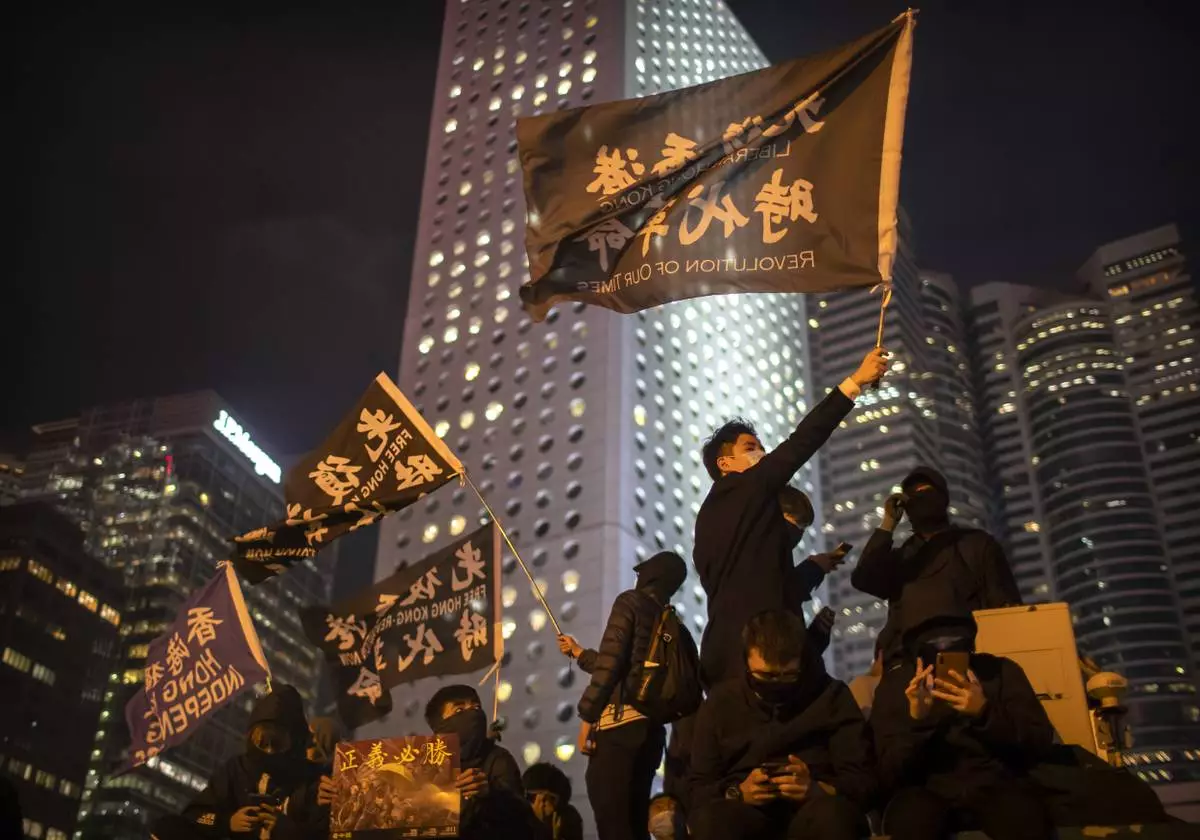
FILE - A protestor holds a flag that reads: "Liberate Hong Kong, Revolution of Our Times" at a rally in Hong Kong, on Dec. 12, 2019. (AP Photo/Mark Schiefelbein, File)
VATICAN CITY (AP) — The Vatican on Thursday gave the green light for Catholics to continue flocking to a southern Bosnian village where children reported seeing visions of the Virgin Mary, offering its approval for devotion in one of the most contested aspects of Roman Catholic practice in recent years.
In a detailed analysis after nearly 15 years of study, the Vatican’s doctrine office didn’t declare that the reported apparitions in Medjugorje were authentic or of supernatural origin. And it flagged concerns about contradictions in some of the “messages” the alleged visionaries say they have received over the years.
But in line with new Vatican criteria in place this year, the Dicastery for the Doctrine of the Faith ruled that the “spiritual fruits” stemming from the Medjugorje experience more than justified allowing the faithful to organize pilgrimages there and permitting public acts of devotion.
THIS IS A BREAKING NEWS UPDATE. AP’s earlier story follows below.
VATICAN CITY (AP) — The Vatican is providing its long-awaited assessment on one of the more contested aspects of Roman Catholicism in recent years: the reported “apparitions” of the Virgin Mary in an otherwise unremarkable village in southern Bosnia.
Following nearly 15 years of study, the head of the Vatican’s doctrine office, Cardinal Víctor Manuel Fernández, is headlining a news conference Thursday on what the Vatican called “the spiritual experience of Medjugorje.”
In 1981, six children and teenagers reported seeing visions of the Madonna on a hill in the village of Medjugorje, located in the wine-making region of southern Bosnia. Some of those original “seers” have claimed the visions have occurred regularly since then, even daily, and that Mary sends them messages.
As a result, Medjugorje has become a major European pilgrimage destination for Christian believers, attracting millions of people over the years. Last year alone, 1.7 million Eucharistic wafers were distributed during Masses there, according to statistics published on the shrine’s website, a rough estimate of the numbers of Catholics who visited.
However, unlike at the more well-known and established Catholic sanctuaries in Fatima, Portugal or Lourdes, France, the alleged apparitions at Medjugorje have never been declared authentic by the Vatican.
And over the years, local bishops and Vatican officials have cast doubt on the reliability and motivations of the “seers,” because of concerns that economic interests may have been driving their reports of continued visions.
Religious tourism has become an important part of the local economy, with an entire industry catering to pilgrims – hotels, private accommodations, family-run farm businesses, even sports complexes and camping sites -- and popping up around Medjugorje. Their growth has contributed to the surrounding municipality's financial well-being after the Bosnian war in the 1990s devastated the economy.
All of which has led to intense speculation about what, exactly, the Vatican will say Thursday, with journalists parsing the significance of the fact that the Vatican didn’t refer to “apparitions” or “visions” in its announcement of the briefing, but merely “the spiritual experience of Medjugorje.”
In 2010, Pope Benedict XVI appointed an international commission of theologians and bishops to formally investigate the reported apparitions, tapping his vicar of Rome, Cardinal Camillo Ruini, to head it.
Pope Francis received Ruini’s report in 2013 or early 2014. In a sneak-preview, Francis in 2017 said the key of the Vatican investigation was to distinguish between the original reported visions in 1981, and the current claims of continuous apparitions, on which Francis cast doubt.
“I prefer Our Lady to be a mother, our mother, and not a telegraph operator who sends out a message every day at a certain time,” he said at the time. “This is not the mother of Jesus and these alleged apparitions have no great value.”
But in an airborne press conference returning home from Fatima, Francis added that it was undeniable that people go to Medjugorje and are converted from sin. “This isn’t a magic wand. You can’t deny this spiritual and pastoral fact,” he said.
Francis went on to appoint two personal envoys to oversee the shrine and the needs of the faithful there, and in 2019 explicitly allowed official church pilgrimages, while making clear that such permission didn’t amount to a decision about the authenticity of the reported visions.
Whatever is announced Thursday, it is unlikely to be a point-blank declaration of authenticity about the Medjugorje phenomena. That is because Fernández earlier this year announced the Vatican was no longer in the business of declaring alleged visions, weeping statues and stigmata as authentic or not.
He released a new criteria for examining such reports and said the Vatican would not make definitive declarations unless the reported event is clearly a hoax. The aim is to prevent the faithful from being harmed by people trying to make money off of their beliefs, he said.
The new criteria envisages six main outcomes, with the most favorable being that the church issues a noncommittal doctrinal green light, a so-called “nihil obstat.” Such a declaration means there is nothing about the event that is contrary to the faith, and therefore Catholics can express devotion to it.
Whatever the outcome, it will surely impact Medjugorje, which lies in the municipality of Citluk, one of the smallest in Bosnia with some 18,000 residents but economically well-off. The municipality has declared that tourism is key for its development, largely thanks to Medjugorje, and hosts various festivals and gatherings each year organized by Christian humanitarian organizations drawn to the place.
Municipal workers say 2024 could be a record year, because Christian pilgrims are tending to stay away from Israel because of the war, and are opting for Medjugorje instead.
“Medjugorje means a lot, all economic sectors lean on Medjugorje,” said Ante Kozina, the tourism association chief. “It is a growth generator for the entire municipality.”
Gec contributed from Belgrade, Serbia.
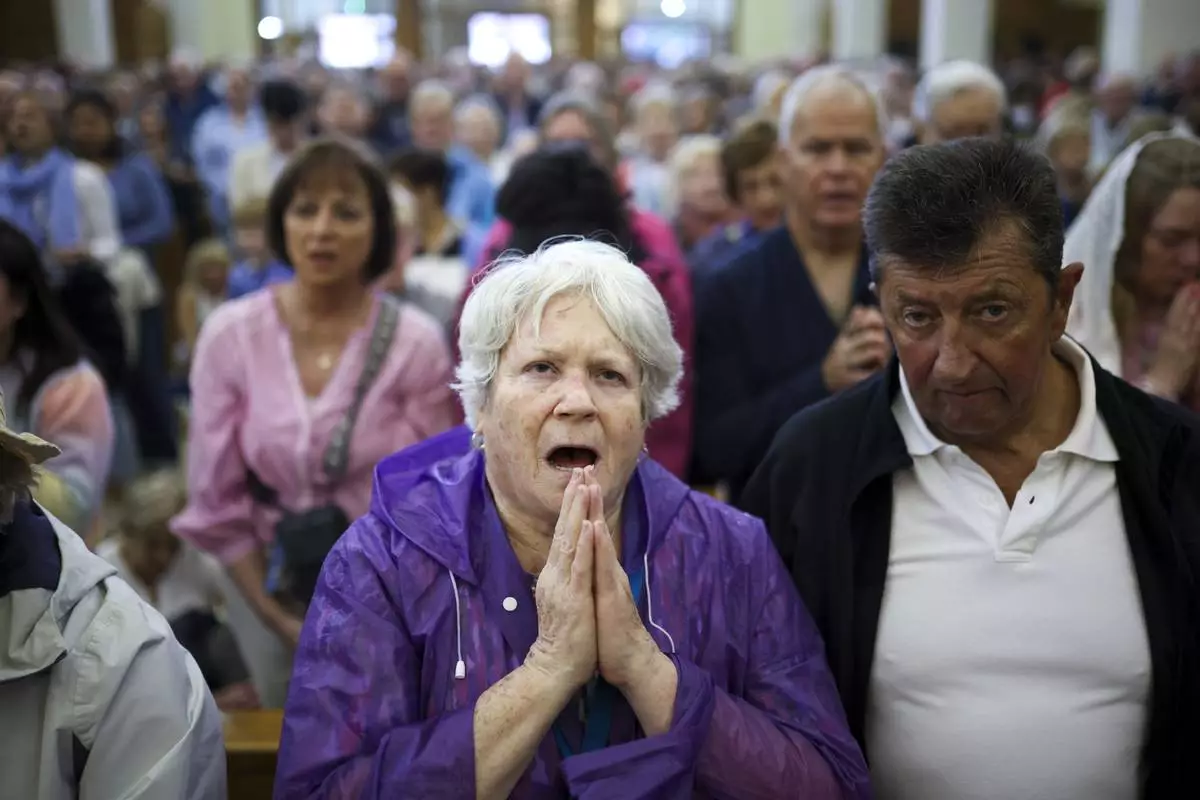
Pilgrims say their prayers inside the St. James Church in Medjugorje, Bosnia, Thursday, Sept. 19, 2024. (AP Photo/Armin Durgut)
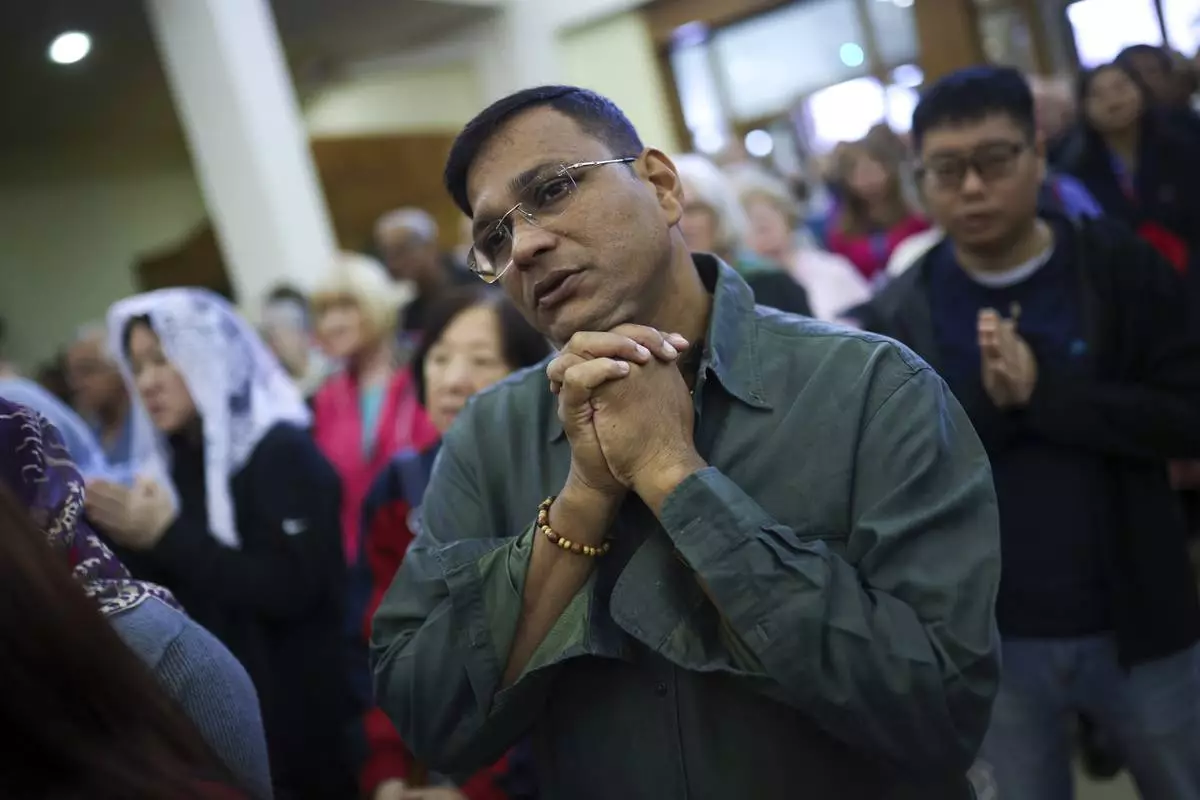
Pilgrims say their prayers inside the St. James Church in Medjugorje, Bosnia, Thursday, Sept. 19, 2024. (AP Photo/Armin Durgut)
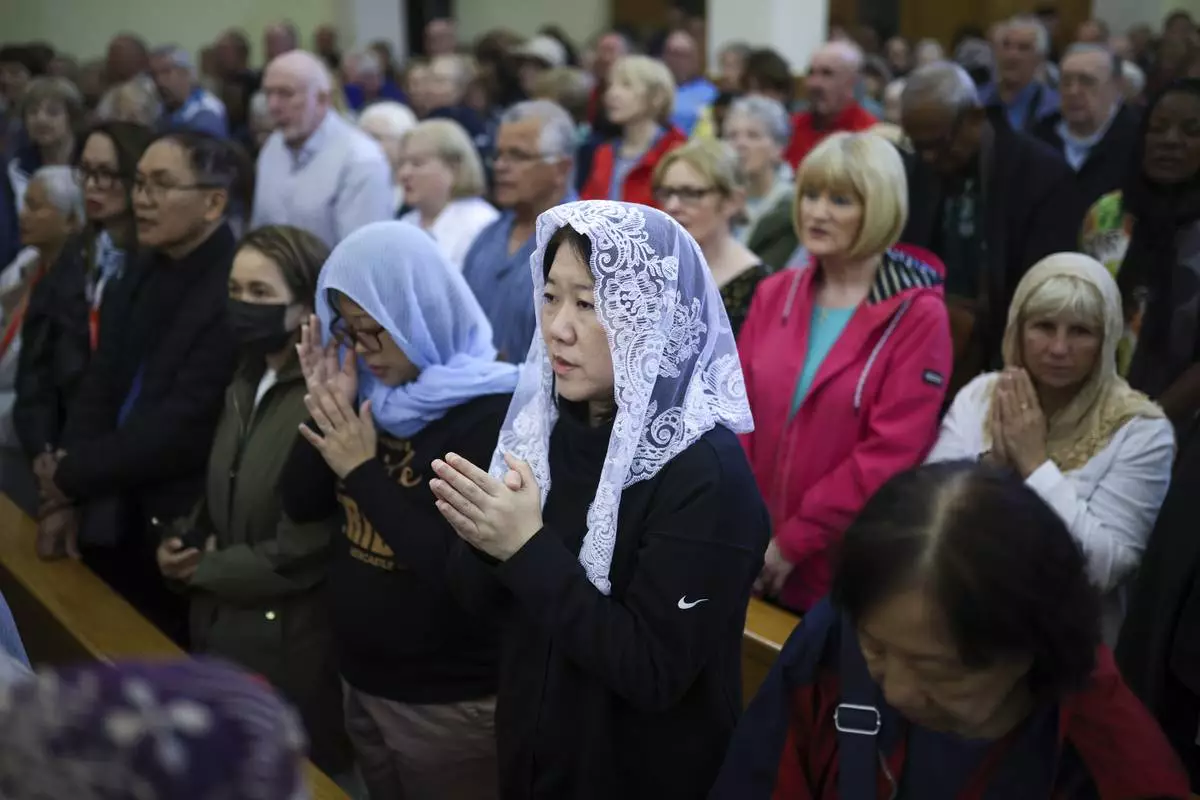
Pilgrims say their prayers inside the St. James Church in Medjugorje, Bosnia, Thursday, Sept. 19, 2024. (AP Photo/Armin Durgut)
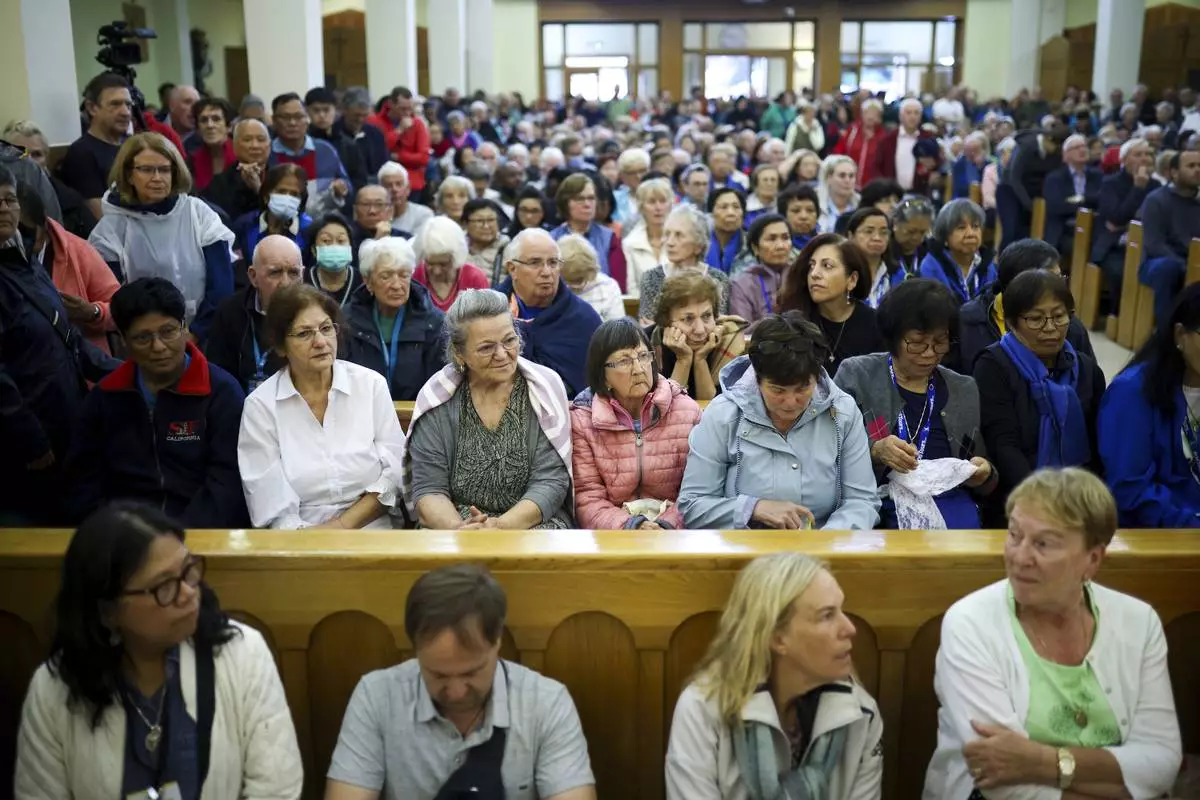
Pilgrims say their prayers inside the St. James Church in Medjugorje, Bosnia, Thursday, Sept. 19, 2024. (AP Photo/Armin Durgut)
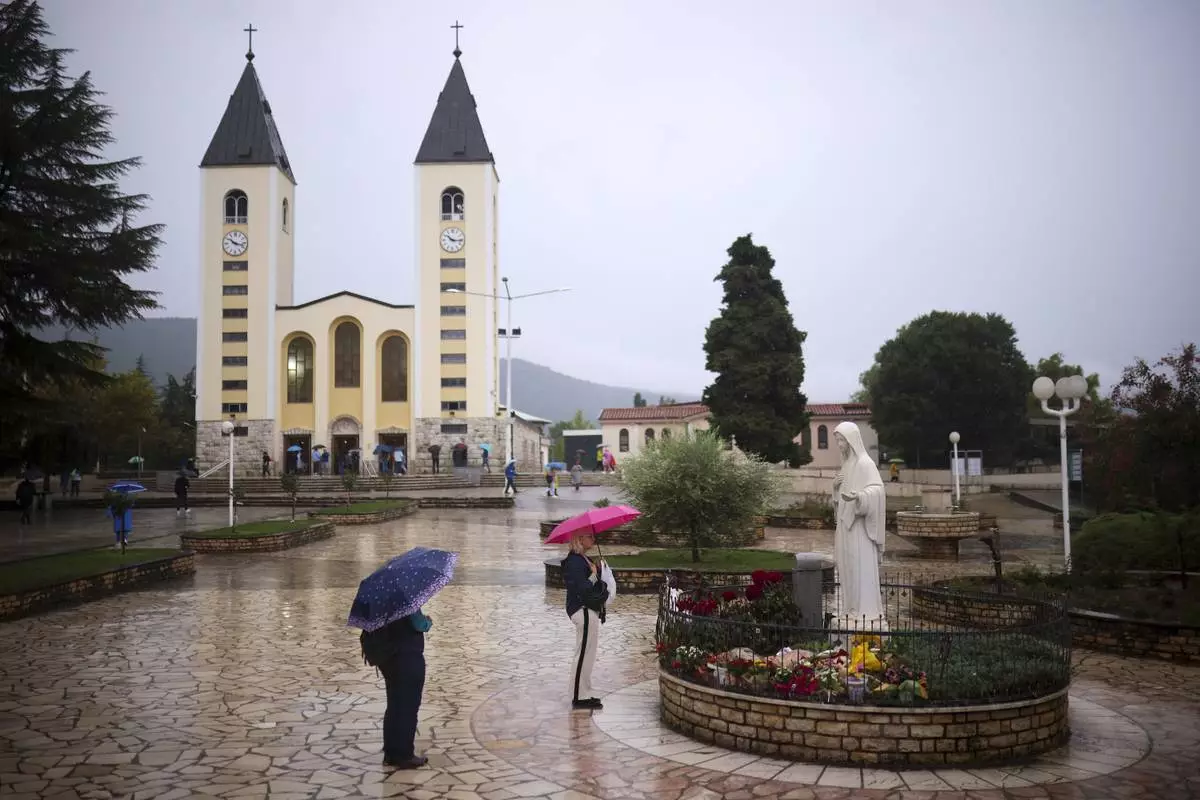
Pilgrims say their prayers next to the statue of the Virgin Mary in Medjugorje, Bosnia, Thursday, Sept. 19, 2024. (AP Photo/Armin Durgut)
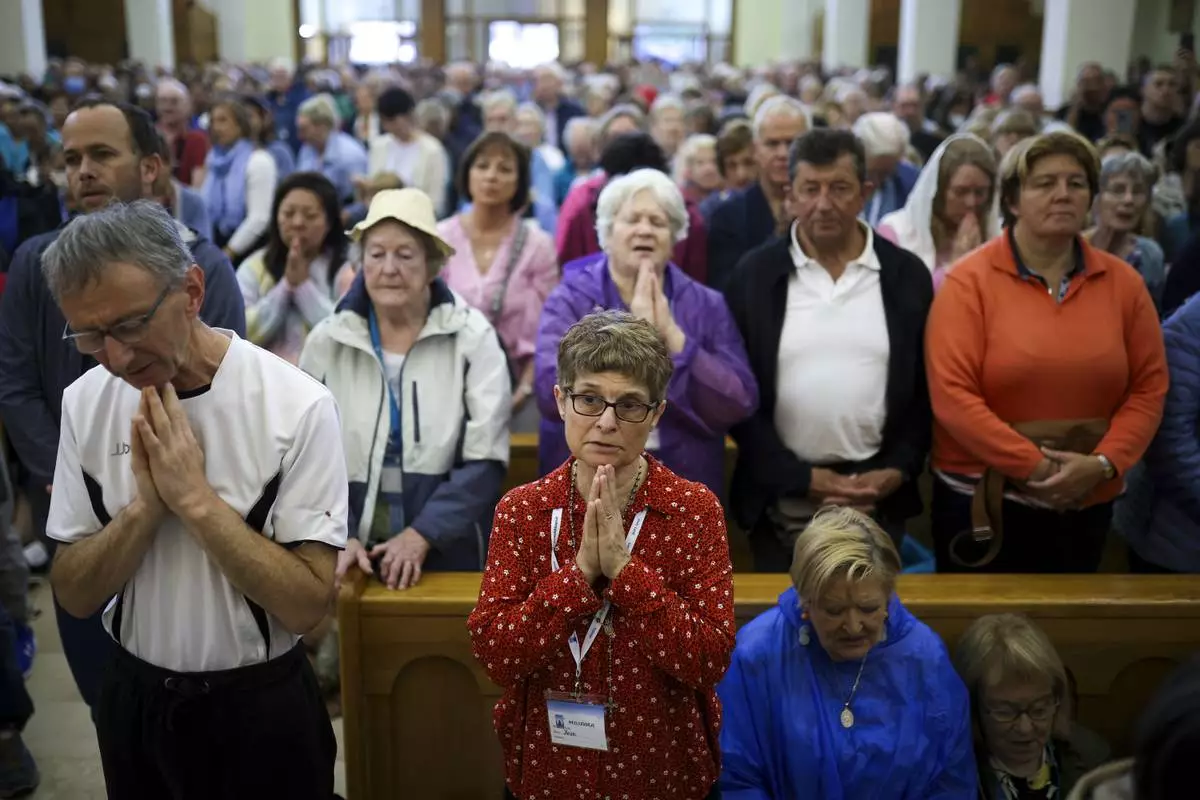
Pilgrims say their prayers inside the St. James Church in Medjugorje, Bosnia, Thursday, Sept. 19, 2024. (AP Photo/Armin Durgut)
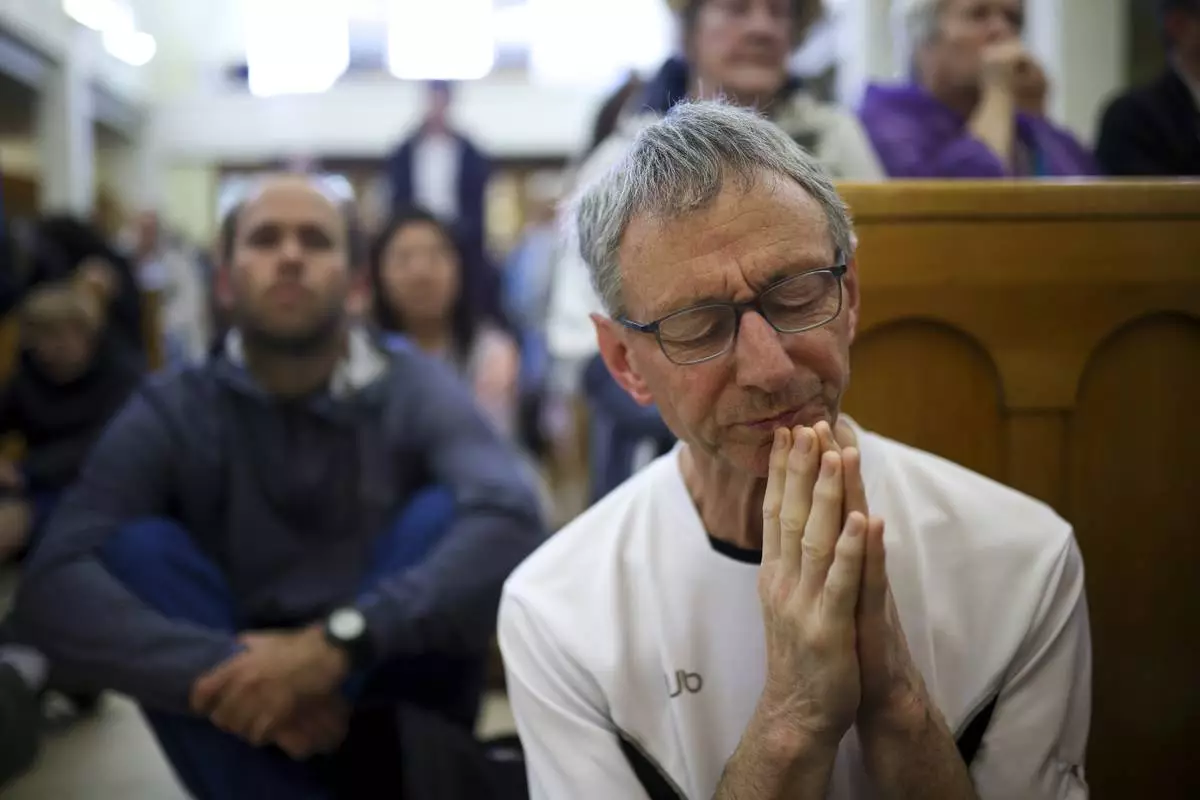
Pilgrims say their prayers inside the St. James Church in Medjugorje, Bosnia, Thursday, Sept. 19, 2024. (AP Photo/Armin Durgut)
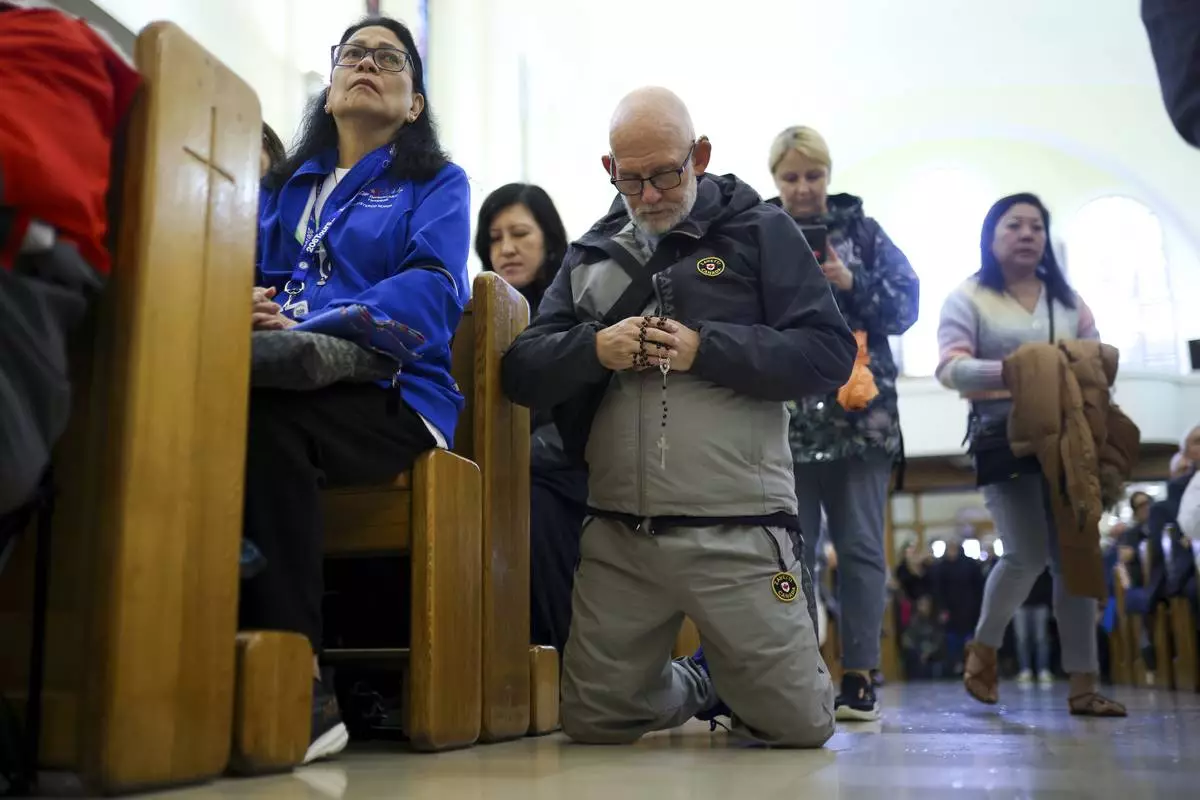
Pilgrims say their prayers inside the St. James Church in Medjugorje, Bosnia, Thursday, Sept. 19, 2024. (AP Photo/Armin Durgut)
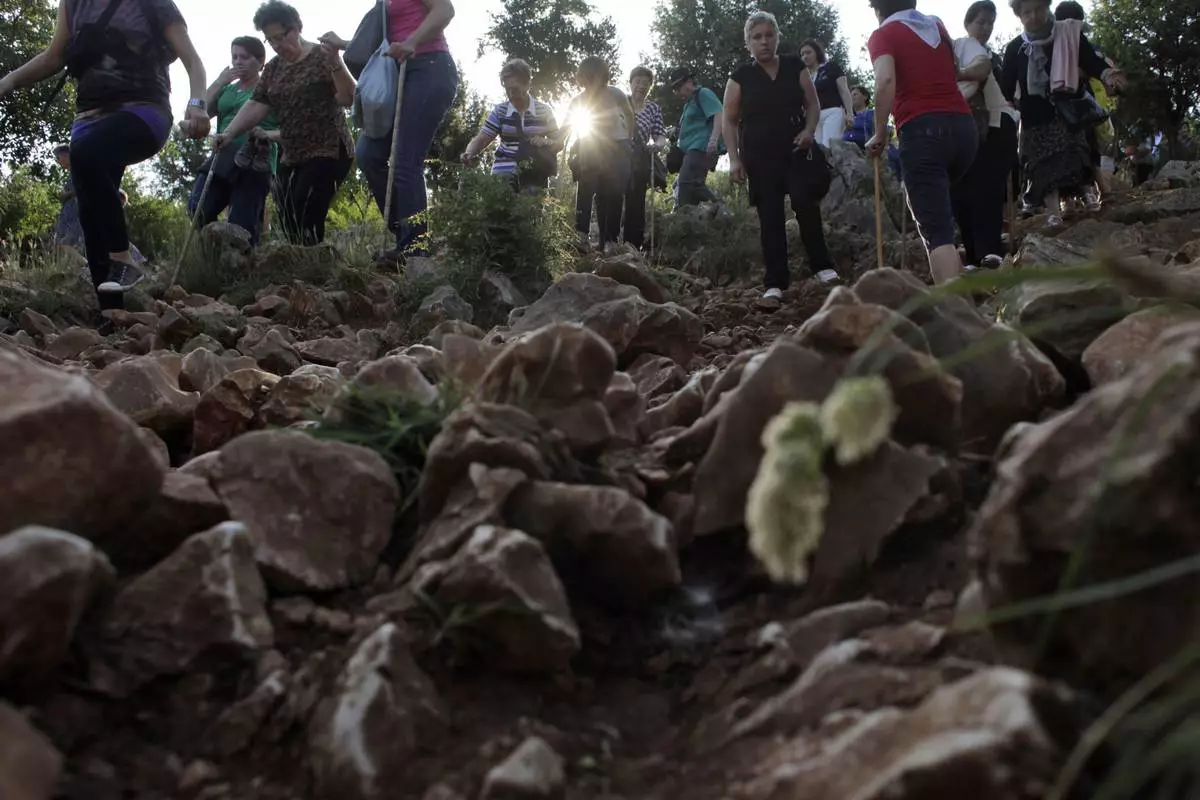
FILE - Pilgrims walk on a rocky terrain to say their prayers on the Hill Of Appearance in Medjugorje, 100 kilometers south of Sarajevo, June 25, 2012. (AP Photo/Amel Emric, File)
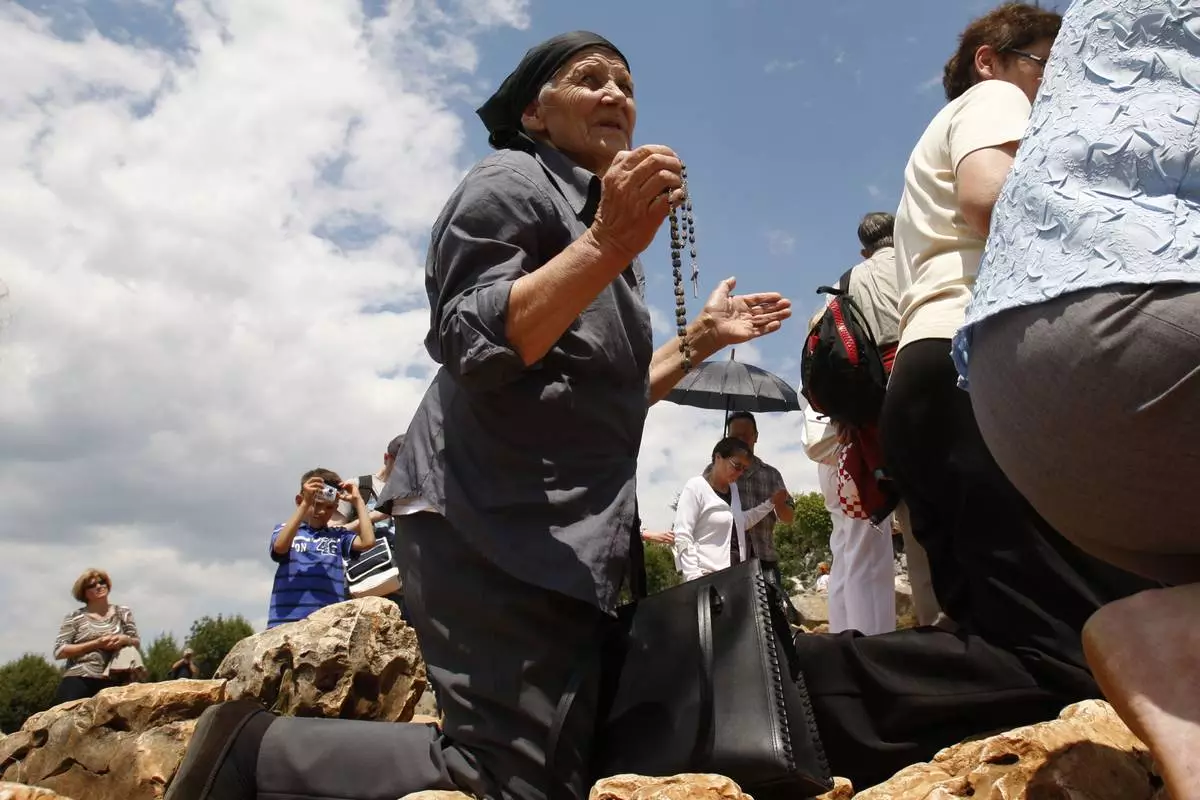
FILE - Pilgrims prays at the "Hill of Apparitions" in the southern-Bosnian town of Medjugorje, 100 kilometers south of Sarajevo, June 25, 2010. (AP Photo/Amel Emric, File)
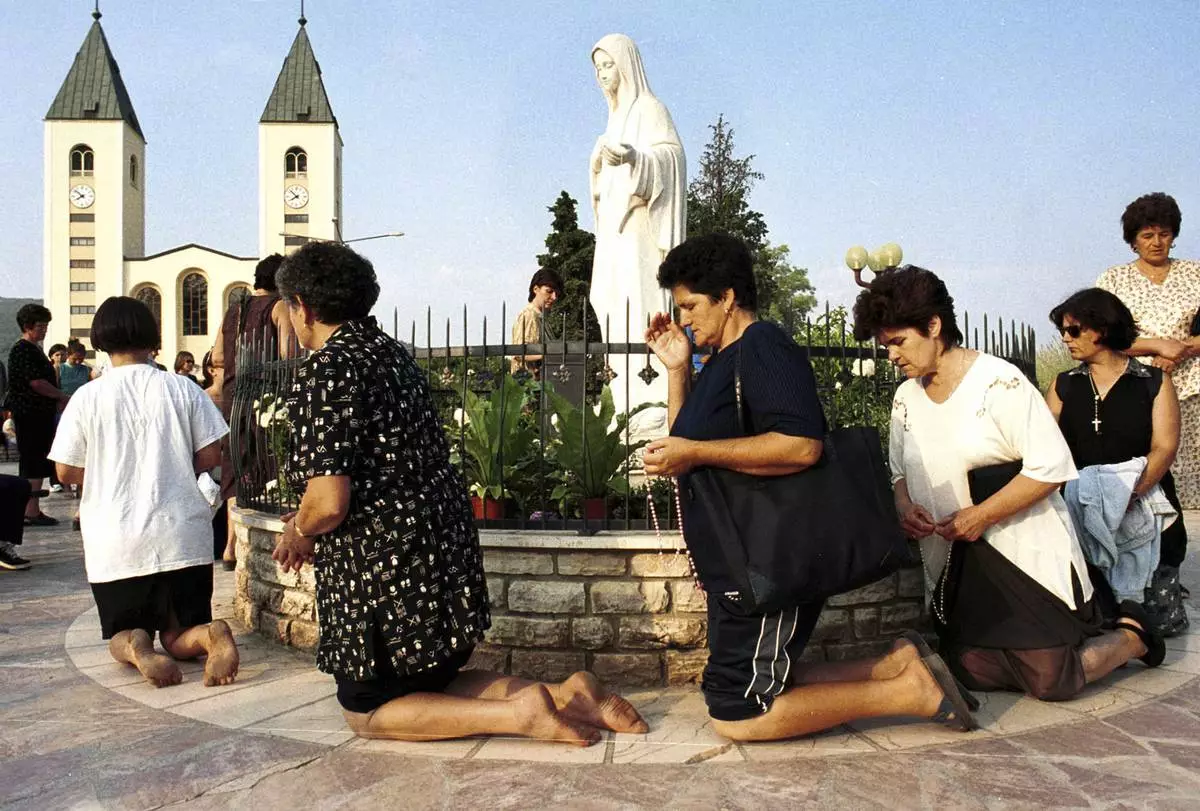
FILE - Bosnian Roman Catholic women pray on the occasion of the feast of the Assumption in Medjugorje, some 120 kilometers (75 miles) south of the Bosnian capital, Sarajevo, on Aug. 15, 2000. (AP Photo/Hidajet Delic, File)



